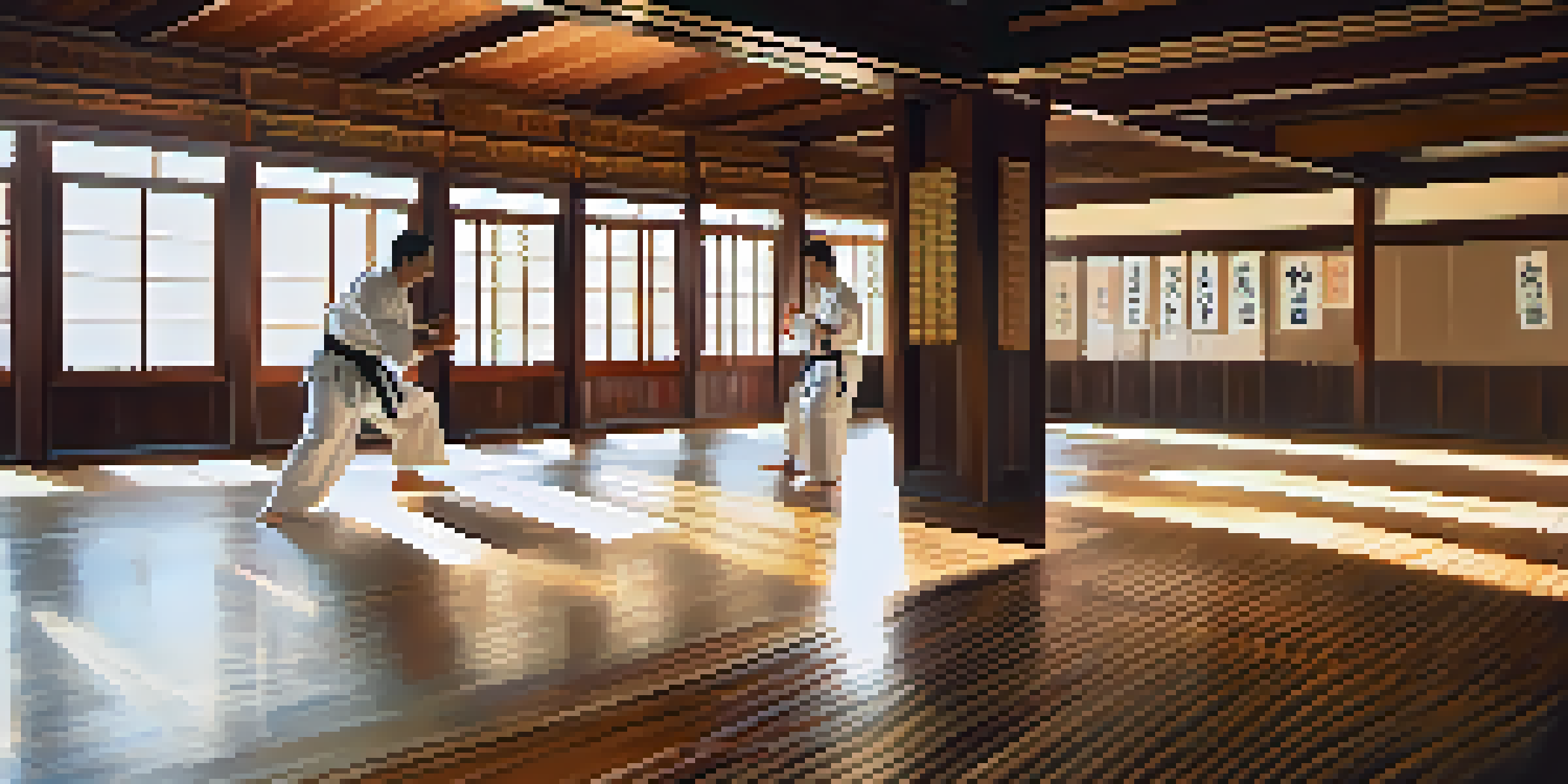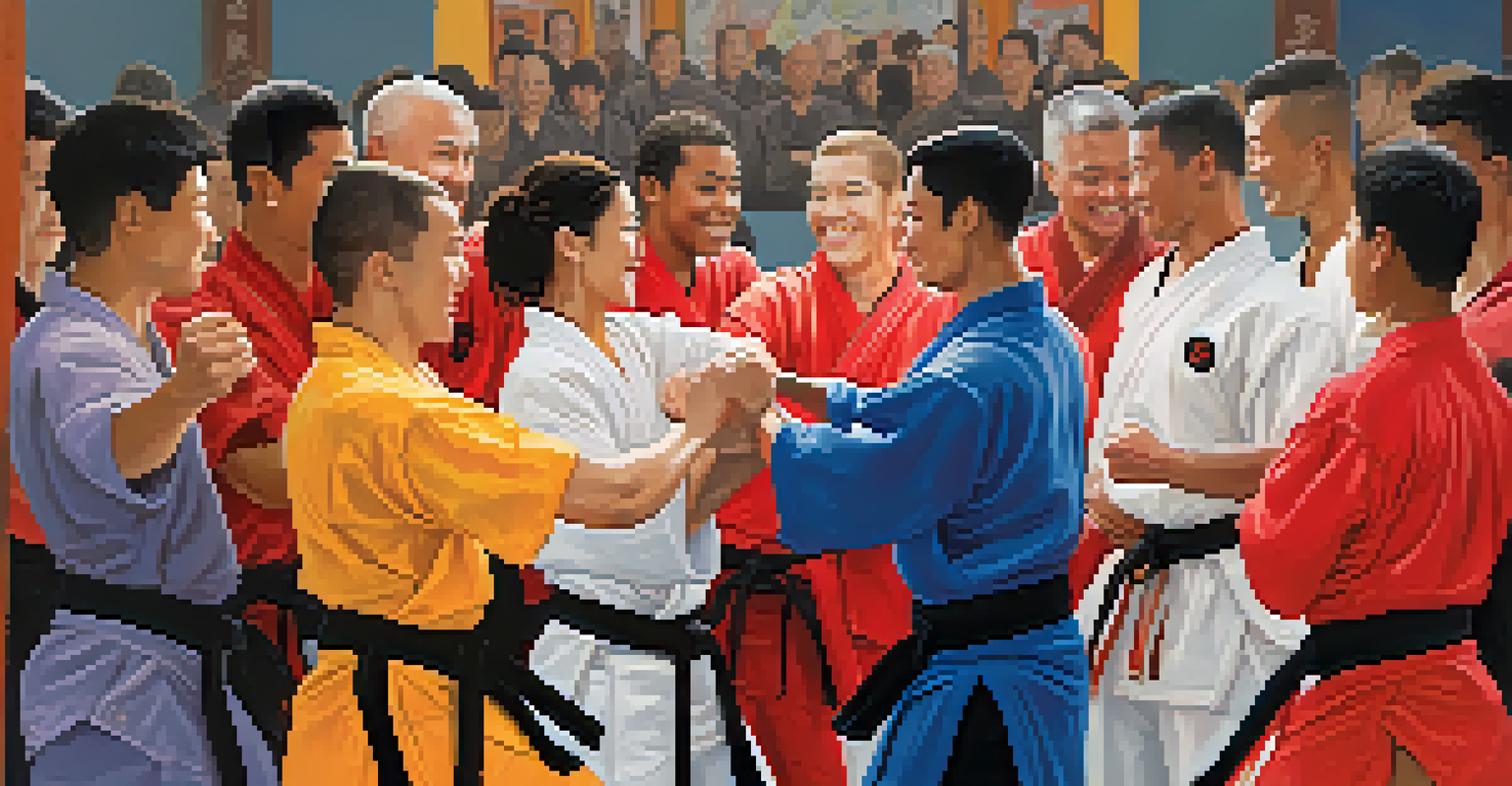The Influence of Martial Arts on Emotional Regulation Skills

Understanding Emotional Regulation in Daily Life
Emotional regulation refers to our ability to manage and respond to emotional experiences effectively. It's crucial not just for personal well-being, but also for navigating social interactions and challenges. When emotions run high, having the tools to calm oneself can make all the difference in decision-making and relationships.
The greatest weapon against stress is our ability to choose one thought over another.
For instance, think about a situation where you're overwhelmed with stress from work. Without proper emotional regulation, you might lash out at a colleague or become paralyzed by anxiety. However, if you can recognize and manage those emotions, you can communicate better and find solutions to your problems.
Martial arts training emphasizes the importance of self-awareness and emotional control, providing practical techniques that can be applied in everyday life. This makes martial arts a unique and effective tool for improving emotional regulation skills.
The Role of Discipline in Martial Arts Training
Discipline is a core principle of martial arts, teaching practitioners to adhere to a structured routine and set goals. This discipline extends beyond the dojo and influences how individuals approach their emotional responses. When students learn to follow a regimen, they also learn the importance of consistency in managing their feelings.

Imagine a martial artist who practices diligently every day. Over time, they cultivate not just physical skills but also mental toughness. This process of repetition and commitment helps them to remain calm and collected in various life situations, whether facing a stressful deadline or a personal challenge.
Emotional Regulation through Awareness
Practicing mindfulness in martial arts enhances emotional regulation by helping individuals recognize and manage their feelings effectively.
As discipline becomes ingrained, individuals find it easier to pause and reflect before reacting emotionally. This leads to healthier responses and a greater sense of control over their emotional state.
Mindfulness Practices in Martial Arts
Many martial arts incorporate mindfulness techniques, which encourage practitioners to be present in the moment. This focus on awareness can significantly improve emotional regulation by helping individuals recognize their feelings without being overwhelmed by them. Through practices like meditation and breath control, martial artists learn to maintain composure.
The more we see, the more we can do. The more we can do, the more we are able to manage our emotions effectively.
For example, during a sparring session, a martial artist must stay aware of both their own emotional state and that of their opponent. This heightened awareness allows them to respond thoughtfully rather than react impulsively, reducing the likelihood of emotional outbursts.
By integrating mindfulness into their training, martial artists develop a toolkit for emotional regulation that they can draw upon in everyday situations, fostering resilience and promoting mental well-being.
Stress Relief Through Physical Activity
Engaging in martial arts provides a powerful outlet for stress relief. The physical activity involved not only releases pent-up energy but also triggers the release of endorphins, the body’s natural mood lifters. This helps practitioners feel more balanced and emotionally stable.
Consider someone who has had a tough day at work. After a vigorous martial arts class, they often leave feeling lighter and more centered. The combination of physical exertion and focus on technique helps dissipate stress and provides a healthier way to cope with life's pressures.
Discipline Builds Emotional Control
The discipline learned in martial arts training fosters consistency in managing emotional responses, leading to healthier interactions.
Regularly practicing martial arts can lead to improved emotional resilience, making it easier to handle stressors in daily life, whether they be work-related or personal.
Building Confidence Through Skill Development
Martial arts training involves mastering new skills and techniques over time, which inherently boosts self-confidence. This newfound confidence can profoundly impact emotional regulation, as individuals feel more empowered to manage their feelings and reactions. When you know you can handle physical challenges, it translates into dealing with emotional ones.
For instance, a student who progresses from a white belt to a black belt gains not just a title but also a sense of achievement. This journey of improvement reinforces the belief that they can overcome obstacles, both in martial arts and in life.
As confidence grows, so does the ability to face emotional challenges head-on, leading to healthier coping mechanisms and a more positive outlook on life.
Community Support and Emotional Well-being
Martial arts often foster a strong sense of community among practitioners. This supportive environment creates a space where individuals can share their struggles and triumphs, enhancing emotional well-being. Knowing that others face similar challenges can lessen feelings of isolation and promote open communication about emotions.
Imagine a martial arts dojo where members celebrate each other’s achievements and provide encouragement during tough times. This sense of belonging can be incredibly empowering, allowing individuals to express their emotions more freely and seek help when needed.
Community Enhances Emotional Well-being
A supportive martial arts community provides a space for sharing struggles and triumphs, promoting emotional health and resilience.
Being part of a community not only supports emotional regulation but also reinforces the idea that it's okay to seek assistance, making it a vital component of emotional health.
Lessons in Resilience from Martial Arts
Resilience is a key takeaway from martial arts training. Practitioners learn to face challenges, endure setbacks, and keep going despite difficulties. This resilience directly translates to emotional regulation, as individuals become better equipped to handle life’s ups and downs with a balanced approach.
For example, after an unsuccessful competition or a difficult training session, a martial artist must reflect on what went wrong and how to improve. This process of learning from failure is crucial for developing emotional strength and the ability to bounce back.

As resilience builds through martial arts, practitioners often find themselves more capable of navigating the emotional rollercoaster of life, leading to greater overall emotional stability.
Conclusion: The Holistic Benefits of Martial Arts
In summary, martial arts offer invaluable benefits for emotional regulation skills through discipline, mindfulness, and community support. By engaging in physical activity and developing resilience, practitioners can effectively manage their emotions in various situations. The journey of mastering martial arts is not just about physical prowess; it's also about cultivating mental and emotional strength.
As individuals grow in their martial arts journey, they find themselves equipped with tools for better emotional management, leading to improved relationships and personal well-being. These skills can have lasting impacts, extending far beyond the dojo into everyday life.
Ultimately, martial arts serve as a holistic approach to personal development, nurturing both the body and the mind, and empowering individuals to lead more balanced, emotionally aware lives.